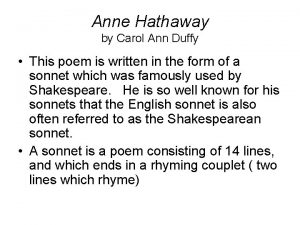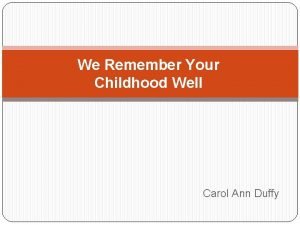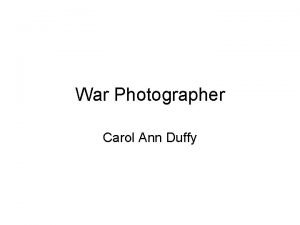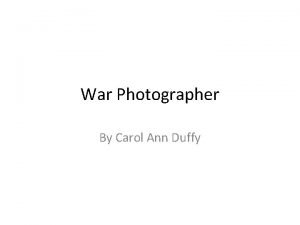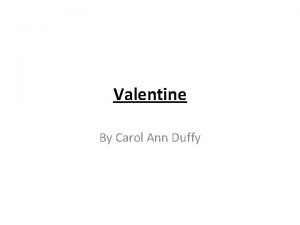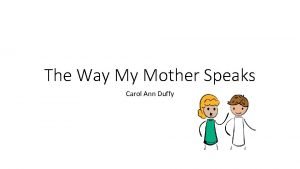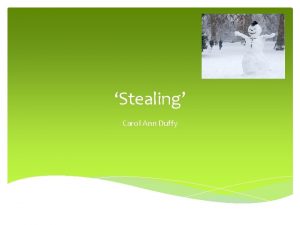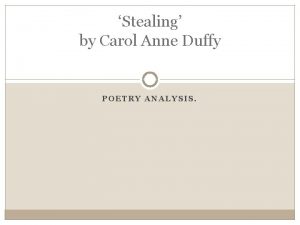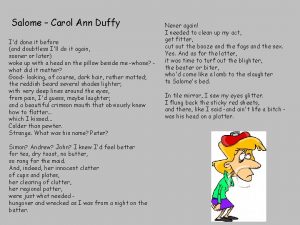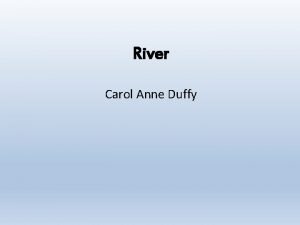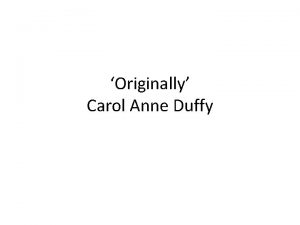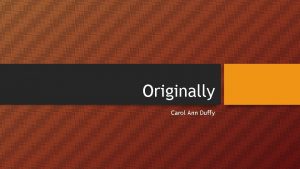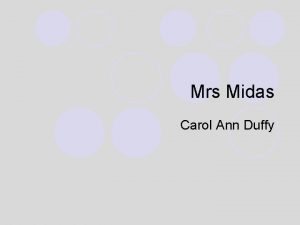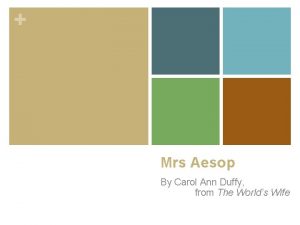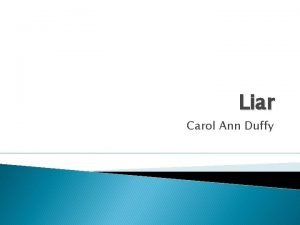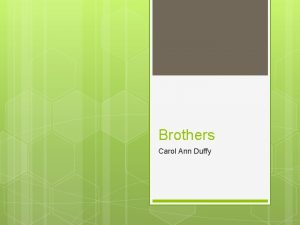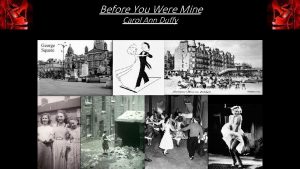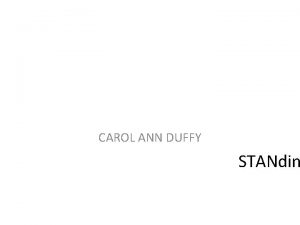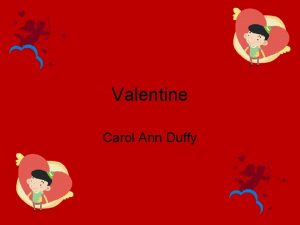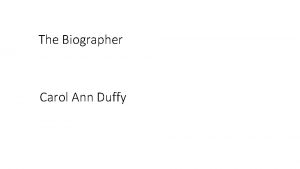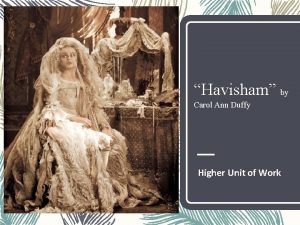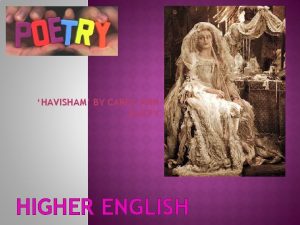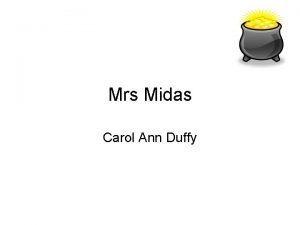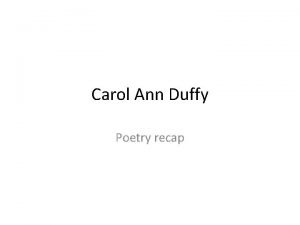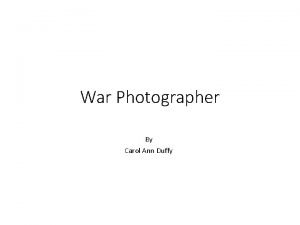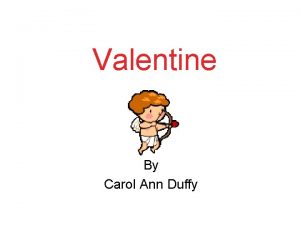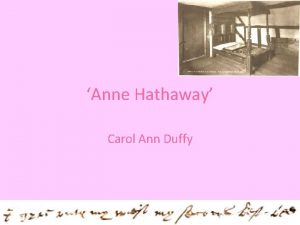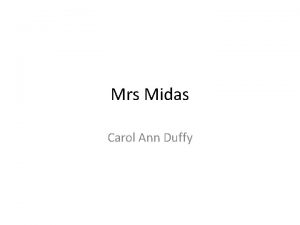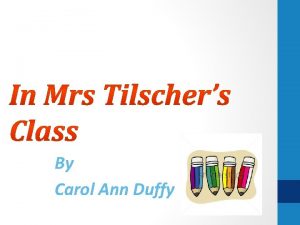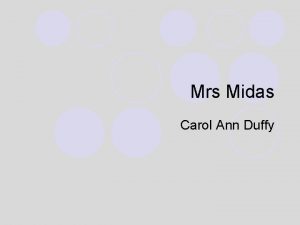An Introduction to Carol Ann Duffy Advanced Higher

























- Slides: 25

An Introduction to Carol Ann Duffy Advanced Higher

Biographical Details Born December 23 rd 1955 in Glasgow Scottish father and an Irish mother Eldest child and had four brothers Brought up in Stafford, North Midlands Father: local councillor, parliamentary candidate 1983 & manager of Stafford FC • Raised Catholic • Education: St. Austin RC Primary, St Joseph’s Convent School (first encouraged to write poetry at age of 10), Stafford Girls’ High School • 1974 went on to read Philosophy at Liverpool University and graduated in 1977 • • •

Career • Worked as a freelance writer in London • Moved to Manchester: Taught creative writing at the Metropolitan University • Daughter, Ella, born in 1995 • Lived in Manchester with her partner, novelist Jackie Kay (ended in 2004 – reflected in poetry) • Won National Poetry competition in 1983 & an Eric Gregory award in 1984 • Awarded an OBE in 1995 and CBE in 2002 • May 1 st 2009 became the UK’s 20 th Poet Laureate

Poetry Collections • ‘Standing Female Nude’ (1985) – Met with acclaim ‘The debut of a genuine and original poet’ Robert Nye, The Times • ‘Selling Manhattan’ (1987) • ‘The Other Country’ (1990) • ‘Mean Time’ (1993) – Won: The Forward Best Collection Prize, A Scottish Arts Council Book Award & The Whitbread Poetry Award • ‘The World’s Wife’ (1999) • ‘The Feminine Gospels’ (2002) • ‘Rapture’ (2005) – Awarded the T S Eliot Prize • ‘Love Poems’ (2010) • ‘The Bees’ (2011)

Other Writing • Two English versions of Grimm’s folk tales – mother invented fairytales for her when she was young and she has always found this form and its archetypes seductive • A pamphlet: ‘ A Woman’s Guide to Gambling’ – reflects her own interest in betting • Published various books for adults & children, as well as being an acclaimed Playwright & Editor – there is a lot of overlap between her poetic & dramatic skills

“I’m not interested, as a poet, in words like ‘plash’ – Seamus Heaney words, interesting words. I like to use simple words in a complicated way. ” “I don’t mind being called a feminist poet, but I wouldn’t mind if I wasn’t. I think the concerns of art go beyond that. I think as long as the work is read it doesn’t really matter what the cover is. I have never in my life sat down and thought ‘I will write a feminist poem. ’” Carol Ann Duffy on Duffy Carol Ann Duffy, interview with Andrew Mc. Allister, Bete Noire 6 (Winter, 1988), p. 71 “Poetry and prayer are very similar. I write quite a lot of sonnets and I think of them almost as prayers: short and memorable, something you can recite. ”

Critics on Duffy “Duffy’s poems are at once accessible and brilliantly idiosyncratic and subtle. ” An Observer reviewer celebrating Duffy’s popularity and technical adroitness “The range of Duffy’s poetry is wide. She is able to engage with important philosophical concerns, write with acute wit and humour, and respond sympathetically to the isolated and oppressed members of society. Hers is a poetry rooted in common experience, but its accessibility belies its complexity and richly allusive nature. ”

Appeal • Duffy is one of the most significant names in contemporary British poetry and is regarded as one of Britain’s most well-loved & successful poets - Appeals to those who wouldn’t normally read poetry - Appears on National Curriculum - Achieved both critical & commercial success - Has been accused of being too populist - But on the whole, her work is highly acclaimed for being both literary and accessible

Influences • Exploration of way in which meaning and reality are constructed through language has led to her work being linked to postmodernism and poststructuralism (thematic influence rather than stylistic – as her style is conservative not experimental) • Use of demotic, everyday language can be traced back to Wordsworth • Interest in Dramatic Monologue links her to Browning & Eliot • Nostalgia & dry humour = Philip Larkin • Elements of surrealism = Dylan Thomas • Links also with the Beat poets and Liverpool poets

Duffy’s Themes Language and the representation of reality The construction of the self Childhood & Personal Identity Gender Issues Contemporary Culture Different forms of alienation, oppression and social inequality • Giving voice • Foreignness & Cultural displacement • • •

Style • Writes in everyday, conversational language which makes her poems appear deceptively simple • Using demotic form, she recreates contemporary versions of traditional poetic forms • Frequent use of dramatic monologue to explore different voices and identities • Use of Sonnet form – contains sense of the ritual of language learned in her Catholic upbringing (esp. ‘Prayer’) • Serious & humorous, mischievous, playful style • Plays with words – exploring way in which meaning & reality are constructed through language

Collections Standing Female Nude Selling Manhattan The Other Country Mean Time

Standing Female Nude

Standing Female Nude - 1985 • Acutely observant poet whose concerns are shared by almost everyone • Range – explorations of love and loss, politics, religion, education, art, childhood and memory • Marshals numerous voices in dramatic monologues • Commitment to giving voice to female perspectives • Not antipathetic to men but sensitive to disaffected and quick to expose unacceptably aggressive sexism of men • Unadorned, female independence stressed • Woman who stands is confident, assertive • Nudity = feels no need to cover herself in any way • Will not conform to expectations of men

Standing Female Nude - 1985 • Particular areas of concern relating to church • Rejecting Catholicism: restrictive, intolerant, unsympathetic and maledominated • Issue of sexuality prominent: sexual politics, interpersonal relationships • Alludes to homosexuality which is explored more extensively in following collections • Confident employment of traditional forms demonstrated: Sonnet for both narrative and descriptive purposes

Selling Manhattan

Selling Manhattan - 1987 • Concern for way in which selfish pursuit of wealth by colonists swamps and effaces culture • Manhattan Island – now favoured place to live for successful writers etc. Originally dwelling place of Native American Indians • Dutch Settler Peter Minuit bought from Indians in 1626 - $24 worth of beads • Criticises Capitalist attitude to economics • Response to British political climate of 1980 s

Selling Manhattan - 1987 • Tory article of faith that wealth was morally good and ‘profit is not a dirty word’ • Duffy did not object to healthy economy but questioned reality of increasing gap between rich and poor • Politics and power major themes • Use of DM gives voice to colonist, criminal, lover, politician, psychopath, ventriloquist & servant • Several love poems dealing with complications & consolations of relationships

The Other Country

The Other Country - 1990 • Continues to explore personal & social themes alongside political concerns • Satirises gratuitous factionalism of politicians & gross offensiveness of tabloid press • Reminds us of power of truth & love • Overtly explores the possibilities & limitations of language • Brings range of issues in own country into sharp focus while suggesting the ‘other country’ might be a preferable place to live

The Other Country - 1990 • More overtly concerned with politics of Britain – addresses Thatcher years • Articulates anger & frustration at transformation of Britain into something unrecognisable • Leads us to reflect on geographical differences between countries & effects they have – language, difference & distance • L. P. Hartley ‘The past is a foreign country: they do things differently there’ – land of childhood & memory

The Other Country - 1990 • Hamlet’s words concerning death ‘The undiscovered country, from whose bourn/No traveller returns’ – Confronting death • Platonic, sexual or romantic love as another country examined • Another person’s otherness can make them seem like an unexplored country • Title offers plurality of meanings – Duffy primarily concerned with such potential in language – readers not led to seek single, reductive ‘answer’ while interpreting

Mean Time

Mean Time - 1993 • Bleakest collection – atmosphere of gloom • Focus on effects of damaged or irreconcilable relationships • Political climate and personal contexts investigated gives little room for optimism • Memory often offers temporary respite from harsh realities that are faced in present – but even these not always helpful

Mean Time - 1993 • Time can be ‘mean’ in the sense that it is malevolent – negative personification of time • Doing something in ‘the mean time’ – waiting for something more significant to happen • ‘Mean’ = average – Time averages out our experience & reduces us to brief interruption in world • Greenwich Mean Time – precise measurement – unable to escape tyranny of time • Losing time with changing of clocks – cannot utter anything which does not make reference to time – verbs past, present and future
 Anne hathaway by carol ann duffy
Anne hathaway by carol ann duffy Carol ann duffy wintering analysis
Carol ann duffy wintering analysis Carol ann duffy we remember your childhood well
Carol ann duffy we remember your childhood well Spools of suffering
Spools of suffering Solutions slop in trays
Solutions slop in trays Duffy valentine
Duffy valentine The way my mother speaks
The way my mother speaks The good teachers poem
The good teachers poem The diet duffy
The diet duffy Stealing carol ann duffy poem
Stealing carol ann duffy poem Stealing poem summary
Stealing poem summary Shooting stars carol ann duffy themes
Shooting stars carol ann duffy themes Salome carol ann duffy poem
Salome carol ann duffy poem Nostalgia carol ann duffy analysis
Nostalgia carol ann duffy analysis Penelope poem by carol ann duffy
Penelope poem by carol ann duffy Originally carol ann duffy annotated
Originally carol ann duffy annotated Originally carol ann duffy poem
Originally carol ann duffy poem Midas personification
Midas personification Mrs aesop annotated
Mrs aesop annotated Medusa by carol ann duffy
Medusa by carol ann duffy Liar carol ann duffy
Liar carol ann duffy From mrs tiresias analysis
From mrs tiresias analysis Carol ann duffy head of english
Carol ann duffy head of english Poem havisham
Poem havisham Brothers carol ann duffy
Brothers carol ann duffy Before you were mine structure
Before you were mine structure
